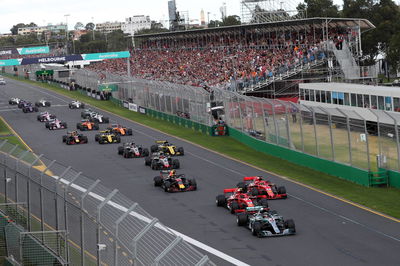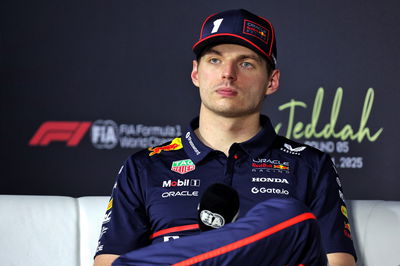2019 tweaks no ‘cure’ for F1’s overtaking issues
The aerodynamic tweaks to the Formula 1 technical regulations for the 2019 season should not be seen as a “cure” to the sport’s current on-track overtaking difficulties, according to CEO and chairman Chase Carey.
Following complaints from drivers that it was difficult to tail cars ahead closely on-track due to the dirty air being produced, the FIA pushed through tweaks to the 2019 technical regulations in a bid to make it easier to follow and increase overtaking opportunities.

The aerodynamic tweaks to the Formula 1 technical regulations for the 2019 season should not be seen as a “cure” to the sport’s current on-track overtaking difficulties, according to CEO and chairman Chase Carey.
Following complaints from drivers that it was difficult to tail cars ahead closely on-track due to the dirty air being produced, the FIA pushed through tweaks to the 2019 technical regulations in a bid to make it easier to follow and increase overtaking opportunities.
The issue has been most evident in Australia and Monaco so far this season, with the lack of passes in the latter resulting in heavy criticism from drivers including world champions Lewis Hamilton and Fernando Alonso.
Speaking at the FIA Sport Conference in Manila earlier this week, Carey explained how the 2019 changes should not be regarded as the cure to F1’s ongoing overtaking headache, but instead as a step in the right direction before a greater overhaul arrives in 2021.
“For sure, overtaking is clearly an issue,” Carey said. “I think we know the steps we’re taking in 2019 with the FIA are not a cure. They are a step. The changes in 2021 will be more significant, so we are more broadly addressing the aerodynamics.
“We don’t want to lose the aerodynamic aspects that make Formula 1 racing so spectacular, but we do think we need to do things that enable overtaking to be a much more significant part of the sport.
“It’s not the only problem. I think there are lots of things that we have underway that will bring a more competitive balance, more action on the track, and in many ways more unpredictability.”
F1 is currently in talks with teams over its vision for the future of the sport from 2021 - when the existing commercial agreements expire - and held meetings outlining plans in both Bahrain and Monaco.
A cost cap is one of F1’s most radical plans for 2021, known to stand at a proposed $150 million per season, while a change in the existing revenue payout structure to teams is also being planned in a bid to remove the current performance disparity throughout the grid.
“Predictability is not good in sports. You want the unexpected, you want the memorable moments that you didn’t see coming, you want that underdog winning,” Carey said.
“You want those sort of things to happen, so we are more broadly addressing the disparity and costs that exist for teams that create an imbalance on the track, a disparity of revenue that has the same impact, the engine regulations, the aerodynamics.
“It’s a whole mix of things that really we believe can provide a much more exciting race for fans, and make it a much better business for everybody.
“Today I think the economics of the sport have gotten into a pretty challenging place for many of the teams. We want it to be a place that new teams want to come into. We want it to be a place where everyone wants to be excited to be a part of it, not just fans, but teams as well.
“We do have a lot of things going on, working in partnership with the FIA to really I think bring the sport to where we think it can and should be to really engage fans around the world in the best way possible.”
Additional reporting by Dieter Rencken in Manila.











